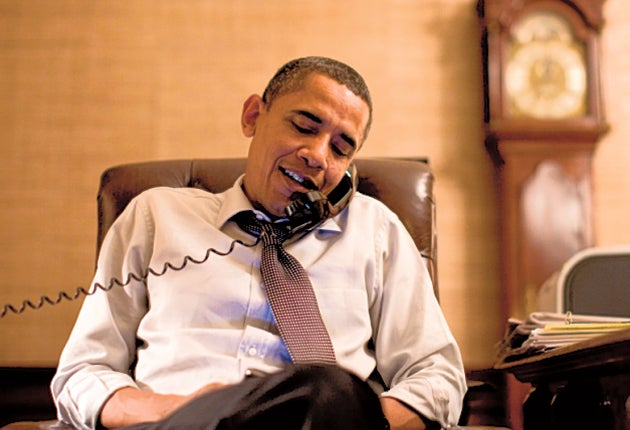Voters have punished me for the economy, says Obama
President accepts responsibility for defeat as he faces challenge of governing without majority in House of Representatives

A subdued but candid President Barack Obama said he took "direct responsibility" for the weak economy in the United States yesterday, asserting that worries about wages and jobs drove voters to punish Democrats and unleash a conservative surge in Tuesday's tumultuous midterm elections.
In their sweep, Republicans easily won control of the House of Representatives with a majority that will likely settle ataround 50 seats. Democrats managed just to retain the US Senate but with a far slimmer majority. "It feels bad," President Obama said of the election in a press conference.
When the new Congress convenes in January, Nancy Pelosi will step aside as House Speaker and hand the gavel to John Boehner, the Republican from Ohio. Thus will start a new two-year span with a divided US Congress and a White House facing forces likely to slow and even halt its agenda.
Mr Obama stopped short of conceding major policy errors, for instance, on pushing through healthcare reform. But he acknowledged that he had failed to fulfil his promise to change "how things get done" in Washington. He meanwhile appealed to the other side to take a more bipartisan approach.
"No one party will be able to dictate where we go form here, so we must find common ground," the president said. "I am very eager to sit down with members of both parties to figure out how we can move forward together." A first priority, even in the remaining weeks of the current, lame-duck Congress will be reaching agreement on renewing George Bush's tax cuts or allowing them to expire.
The shift to the right was seen in nearly every congressional district. But it has left a country not more united but more divided. Exit polls showed, for instance, that while eight out of ten Republicans want government to do less, two thirds of Democrats think it should do more. Eight of ten Republicans want Mr Obama's healthcare reforms repealed. Six out of ten Democrats want them expanded.
The Republican wave saw Democrats pushed from governors' mansions in Pennsylvania, Ohio, Michigan, Wisconsin, Iowa, Tennessee, Kansas, Oklahoma, New Mexico and Wyoming. Early yesterday, a razor-close race for governor in Florida, a vital swing state, was declared for Republican Rick Scott. Two Democrats prevailed, however: Andrew Cuomo in New York and Deval Patrick in Massachusetts.
The losses of the governorships in Florida, Ohio and Pennsylvania are a particular blow for Mr Obama who will feel their absence if, as is still assumed, he is the party nominee in the 2012 presidential race.
The Tea Party will now be a significant presence on Capitol Hill. Mario Rubio and Rand Paul, winners of Senate races in Florida and Kentucky, stand out but partiers will storm the lower chamber too. Well over four-fifths of the House candidates who had Tea Party backing won their races.
Mr Boehner, who attempted a statesmanlike air at a post-election press conference at the Capitol – he cried after winning re-election in Ohio – signalled that he would like to see all the Bush tax cuts extended.
Mitch McConnell, the Republican leader in the Senate, claimed that voters had shown their gratitude to his party for saying "no" to the Obama agenda. "The healthcare bill was, in my view, a sort of a metaphor for the government excess that we witnessed over the last two years," he said.
Among the handful of still undecided races, none were drawing more attention than the Senate contest in Alaska where so-called "write-in" candidates defeated Tea Party candidate Joe Miller and the Democrat Scott McAdams. It may be days before it will be clear whether that spells victory for Lisa Murkowski, the moderate Republican who ran a long-shot, write-in campaign after losing the Republican primary to Miller.
For Mr Obama, an early impulse may be to turn to foreign policy for salvation. He leaves for a ten-day tour of Asia tomorrow. But his international agenda also looks fraught. A newly hawkish influence from Capitol Hill may impede progress on Middle East peace and winding down the war in Afghanistan.
A star winner on Tuesday was Marco Rubio in Florida. A telegenic son of Cuban immigrants, he has been under the quiet mentorship of former governor Jeb Bush who sees in him a future "Latino Reagan". Some see in Rubio a possible vice-presidential running mate even in 2012.
"Some election nights are more fun than others. Some are exhilarating, some are humbling," Mr Obama conceded in his East Room press conference. On his hopes for a new spirit of consensus, he acknowledged it might not come easily. "I won't pretend that we'll be able to bridge every difference or solve every disagreement," he said.
He gave no quarter, for instance, to questioners asking about the Republican threat of a repeal of the healthcare reform package, saying that voters had made it clear that they did not want see a "re-litigation" of the last two years in Washington. But he added: "If the Republicans have ideas for how to improve our healthcare system, if they want to suggest modifications that would deliver faster, more effective reform ... I am happy to consider some of those ideas."
It was on the slow progress of the economic recovery that Mr Obama came closest to acknowledging that the Tuesday's vote was a rebuke of him. "Clearly too many Americans haven't felt that progress yet, and they told us that yesterday," he said. "And, as President, I take responsibility for that."
Join our commenting forum
Join thought-provoking conversations, follow other Independent readers and see their replies
Comments
Bookmark popover
Removed from bookmarks